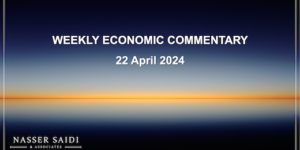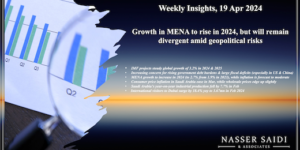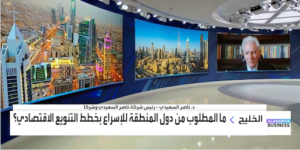Markets
US stock markets displayed solid weekly gains, despite a mixed opening of the earnings’ season, as Chinese officials seemed to pursue a less confrontational strategy in response to Trump’s tariff threats. The S&P 500 closed at 5-month high (with an energy stocks rally offsetting the decline in financials’ share), while the Nasdaq hit a record. The positive mood on Wall Street reverberated throughout the major bourses with Europe and, especially, Japan also on the rise. Emerging markets scored their first weekly gain after four weeks of losses. Regional markets were mixed following the oil prices gyrations with KSA and Abu Dhabi ending on a cheerful note, while most others were stable or in the red. The dollar recorded its biggest weekly gain in a month vis à vis the euro, in response to the highest inflation rate since early Feb 2012 which makes further Fed hikes more likely. Against the yen the USD reached a 6 month high and the pound took a hit after Trump asserted that a soft Brexit could “kill off” a bilateral trade deal. After Libya announced the resumption of exports, oil prices suffered a sell-off at mid-week — which provoked Brent’s sharpest one day percentage loss since Feb 2016 — and, furthermore, rumors spread over the possible easing of US sanctions against Iran and the US pressure on Russia to increase production. Towards the end of the week oil prices rebounded in the wake of a 12.6mn barrel drop in US crude inventories, more than twice analysts’ expectations. Gold prices continued their slide, threatening to break key support levels, despite global tensions.
Global Developments
US/Americas:
- The US Fed’s monetary policy report (issued ahead of Powell’s testimony to Congress this week), indicated that the central bank is upbeat on US economic conditions and that ‘gradual’ interest rate hikes will continue as planned.
- The US administration announced 10% tariffs on goods covering an extra USD 200bn worth of Chinese imports.
- US inflation was 0.1% mom (2.8% yoy) in Jun vs 0.2% (2.7% yoy) in May. Energy prices fell -0.3% mom. Excluding food and energy, the CPI rose 0.2% mom (2.2% yoy, as in May).
- US wholesale inventories jumped 0.6% mom in May vs 0.1% in Apr. Durable goods rose 0.5% and nondurable goods 0.7%. Wholesale sales surged 2.5% mom.
- The University of Michigan Consumer sentiment index lost 1.1 points, falling to 97.1, its lowest level since Jan. Current economic conditions, business sentiment and business expectations declined, as the trade war displayed its impact. Consumers’ expectations ticked up due to income optimism
- US initial claim for unemployment insurance fell 18,000 to 214,000; the 4-week moving average fell from 224,750 to 223,000 and continuing claims fell by 3,000 to 1.739 mn.
Europe:
- Industrial production in the Eurozone grew 1.3% mom (2.4% yoy) in May, offsetting the -0.8% decline (1.7% yoy) in Apr, driven by a stellar German output. Italy and Spain also posted upbeat figures, while France disappointed.
- The ZEW Economic sentiment indicator for the Eurozone fell to -18.6 in Jul from -12.6 in Jun, the lowest since Aug 2012; 55.3% of the analysts surveyed expect no changes in economic activity over the coming 6 months and 31.7% expect it to worsen, while only 13.0% expect an improvement.
- German inflation was unchanged at 2.1% yoy in Jun with both goods and services prices increasing at the same rate as in May. Excluding energy items, inflation was unchanged at 1.7% yoy.
- The ZEW Economic sentiment indicator for Germany lost 8.6 points to -24.7 in Jul, the lowest since Aug 2012, due to worries over the trade war with the US.
- The German trade surplus fell to EUR 19.7bn in May from EUR 21.8bn a year earlier.
- UK industrial production declined -0.4% mom in May, adding to the -1% fall in Apr. Most of the drop can be attributed to a weather-related plunge of -3.2% mom in energy production and a -4.2% mom in mining and quarrying. Manufacturing rose by 0.4% mom (1.1% yoy) after 3 months of decline.
- The UK trade deficit shrunk to GBP 2.8bn in May from a GBP 3.1bn in Apr.
- Fitch lowered its rating on Turkey one notch, exacerbating its junk state.
Asia Pacific:
- China’s inflation increased to 1.9% yoy (-0.1% mom) in Jun from 1.8% in May. Food inflation crawled up slightly.
- China’s M2 money supply grew 8.3% yoy in May, unchanged from Apr, as credit growth continued to decline, as it has since the Party Congress in Nov called for a clean up in the shadow banking sector.
- China’s trade surplus widened to USD 41.6bn in Jun, following the USD 24.9bn in May. Exports were up 11.3% yoy, while imports gained 14.1%. Trade surplus with the US rose to USD 28.97bn, a record since the data series began in 1999.
- China’s foreign direct investment increased by 1.1% yoy to CNY 446.29bn in Jan to Jun. In Jun alone, FDI rose by 0.3% yoy to CNY 100.7bn. In 2017, China FDI went up 7.9%.
- China’s producer price index increased 4.7% yoy in Jun, the highest since last Dec.
- Japan’s current account surplus widened to JPY 1.94tn in May from JPY 1.7tn in the same month a year ago.
- Japan’s core machinery orders tumbled -3.7% mom in May, following a 10.1% surge in Apr.
- Indian inflation was 5% yoy in Jun a decimal above the May rate. Energy costs are spreading to all prices, but food inflation remains subdued. Higher rental allowances for government workers provoked a surge in housing inflation.
- India’s industrial production grew 3.2% yoy, in May vs 4.8% in Apr. Manufacturing rose 2.8% much slower than 5.3% in Apr.
- Singapore’s GDP growth slowed to 3.8% yoy in Q2 from 4.3% in Q1. Manufacturing was the main driver surging 8.6% yoy in Q2 (but down from 9.7% in Q2). Construction value added decreased, but at a slower rate.
- South Korea’s seasonally adjusted unemployment rate declined to 3.7% mom in Jun.
Bottom line: The macro data flow reserved few surprises, but the EU Commission trimmed its growth forecasts for 2018 and 2019 by a couple of decimals arguing that the aggressive strategy by Trump on redesigning the trade agreements will take its toll on the EU exports. However, the worse impact will be felt in emerging markets, where equity investment funds last week suffered a USD 900mn withdrawal, topping their longest continuous streak of withdrawals in more than two years totaling USD 17bn over the past 10 weeks.
Regional Developments
- Bahrain’s real GDP shrank by 1.2% yoy and 0.5% qoq in Q1 this year, with the oil sector posting a 14.7% dip. Non-oil sector remained the saving grace, expanding by 1.9% yoy, after gains in the manufacturing (+4.2% yoy) and construction (+6.7% yoy) sectors outweighed the financial (-0.06%) and hospitality (-9.4%) sectors. In current prices, Q1 GDP was up by 5.1% yoy, with the oil and non-oil sector reporting 17.3% and 3.4% growth respectively.
- The IMF maintained a favourable outlook for Egypt, predicting average inflation at 14.4%, and growth at 5.5% in the 2018-19 fiscal year, supported by the tourism sector and natural gas production. The Fund estimates a financing gap of USD 1bn this year for Egypt, and also warned against the risks of rising fuel prices and an investor exit from emerging markets.
- Inflation rate in Egypt increased to 14.4% in Jun (May:11.4%), after the sudden hikes in increases in fuel, electricity and transportation fares last month. Transport costs (+34.2% mom) and utilities (+7%) account for a major share of the rise.
- Remittances into Egypt grew by 48.2% yoy to USD 26bn in the first 10 months of the 2017-19 fiscal year. Remittances in the month of Apr alone had surged by 41.2% yoy to USD 2.3bn.
- Egypt’s finance minister disclosed that amendments to the Real Estate Transactions Tax Act do not impose any new taxes or increase the tax burden. The real estate transactions tax’s adjustments were aimed to end the tax evasion, and the tax stands at 2.5% of the value of the transaction.
- Egypt’s non-oil exports to China increased by 60% yoy to USD 408mn in 2017, according to Egypt’s trade minister.
- In Jordan, citizens under the age of 15 account for 34% of the total population (as per the 2015 census); about 62% are aged 15-64. The age dependency ratio touched 61% in 2017, while the average family size declined by 11% to 4.82.
- Passenger traffic at the Kuwait International Airport increased by 18% yoy to 1.22mn passengers in Jun.
- The IMF believes that by accelerating reforms and pursuing fiscal adjustments after a new government is formed in Lebanon will boost growth and reduce deficit.
- Lebanon’s central bank head expects the economy to grow at 2% this year, with inflation ranging between 4-5%.
- Oman’s trade balance surplus reached OMR 1.2bn by end of Mar. Exports surged 27.2% yoy to OMR 3.7bn, while imports grew 2.1% yoy to OMR 2.5bn.
- Oman’s inflation rate increased to 1.4% yoy in Jun from 0.8% in May.
- Saudi Arabia published a draft law that covers Public-Private Partnerships: it offers investors exemptions from labour laws, real state ownership restrictions and other regulations. Public consultation on the document will run for three weeks.
- Saudi Arabia’s Capital Market Authority approved its first two financial technology licenses on a trial basis: start-up Manafa Capital and Scopeer are set to offer crowdfunding investment services.
- The average monthly salary of Saudi citizens increased by about 2% qoq to SAR 10,089 (USD 2750) in Q1 2018 while average salaries for expats grew by 3% to SAR 3768.
- More than 232k expats left Saudi Arabia in Q1 this year, but unemployment rate among the Saudis continues to stand at 12.9%.
- South Africa disclosed that Saudi Arabia is planning to invest at least USD 10bn in the country, mostly in the energy sector, including building oil refineries. The details will be given during an investment summit to be held later this year.
- The Global Innovation Index ranking places Switzerland on top of the list & UAE as the leader in the Arab world (ranked 38th globally). The report and rankings can be accessed at: https://www.globalinnovationindex.org/Home
UAE Focus
- The Emirates NBD Dubai Economy Tracker fell to 56 in Jun (May: 57.6). Wholesale & retail continued its strong performance (58.6), followed by construction (57.1) and travel & tourism (54.9). Business activity expectations improved to a record-high (the index began in Apr 2012).
- Banks in the UAE can now charge VAT on fees, according to a circular from the central bank, reversing a previous notification that prevented banks and finance companies from increasing existing fees (by charging VAT).
- The UAE cabinet has approved the implementation of VAT refunds for tourists from Q4 this year.
- SMEs contribution to the Dubai economy stood at 47% in 2016, rising from 40% in 2009, while their contribution to job creation grew to 52.4% (from 42%), according to Dubai SME’s latest report. More than 94% of the companies operating in the UAE are SMEs, and account for more than 86% of the total private sector workforce as well as more than 60% of the country’s current GDP, as per the Ministry of Economy.
- UAE’s banks have reduced the number of branches to 754 as of end-May, from 771 at end-2017, according to UAE central bank’s recent data. Employees at the UAE state-run banks stood at 35,010 in the same period, up from 34,670 while foreign banks’ staff dropped 0.3% to 5,598 employees.
- UAE companies and listed firms have an exposure of up to USD 1bn to Abraaj Group. Commercial Bank of Dubai and Mashreq Bank have up to USD 500mn combined exposure, one of the largest after Air Arabia disclosed USD 336mn worth of exposure. First Abu Dhabi Bank revealed direct exposure to Abraaj through a fully secured three-year loan of USD 21.4mn, which is due to mature in Apr 2019.
- The planned initial public offering of the education company GEMS (in London) has been shelved, reported Reuters, citing multiple sources. Given the freeze in Dubai school fees this year, not only would expansion plans be affected, but the financial forecasts would also need to be adjusted.
- Dubai-South Korea bilateral non-oil trade grew by 8.4% yoy to AED 27.43bn (USD 7.46bn) in 2017.
- UAE and Russia have signed a visa exemption pact, in a bid to encourage tourism, investment and trade. Total non-oil trade between the two countries reached USD 2.5bn in 2017, up from 2016’s USD 2.1bn.
- UAE extended compulsory military service for Emirati men to 16 months from 12 previously; those without a high school qualification continue to serve for two years.
Media Review
Arab states are losing the race for technological development
https://www.economist.com/graphic-detail/2018/07/12/arab-states-are-losing-the-race-for-technological-development
As foreign investors exit emerging markets, Egypt treasury yields hit 1-year highs
https://af.reuters.com/article/egyptNews/idAFL8N1U84F7
Will the Aramco IPO ever happen?
https://www.wsj.com/articles/doubts-grow-aramco-ipo-will-ever-happen-1530813982
Calling off the Aramco IPO would not be too disruptive
https://www.zawya.com/uae/en/story/Aramco_IPO_retreat_would_leave_few_losers-ZAWYA20180708051616/
The ghost army of workers in the GCC
https://www.bloomberg.com/news/articles/2018-06-20/workers-paid-to-do-nothing-a-ghost-army-that-haunts-gulf-rulers
The Fed on autopilot
https://www.wsj.com/articles/economists-in-new-survey-see-federal-reserve-on-autopilot-1531404001
Powered by:







